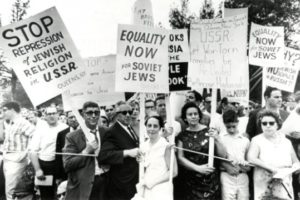 Elliott Abrams, U.S. Assistant Secretary of State for Human Rights and Humanitarian Affairs, said here at a press conference that the issue of Soviet Jewry will be brought up by the American delegation at the United Nations Human Rights Commission conference which opened yesterday. In addition, the case of imprisoned Soviet Jewish activist Anatoly Shcharansky is also expected to be brought up by the delegation.
Elliott Abrams, U.S. Assistant Secretary of State for Human Rights and Humanitarian Affairs, said here at a press conference that the issue of Soviet Jewry will be brought up by the American delegation at the United Nations Human Rights Commission conference which opened yesterday. In addition, the case of imprisoned Soviet Jewish activist Anatoly Shcharansky is also expected to be brought up by the delegation.
Meanwhile, Avital Shcharansky, Anatoly’s wife, is in Switzerland where she has been meeting with government and International Red Cross officials in an effort to have them intercede on behalf of her husband. She was invited here by a group called the “Association for Helsinki,” supporters of the Helsinki human rights accords.
In Bern, Mrs. Shcharansky met with the Foreign Ministry’s Director General, Raymond Probst, and with several members of Parliament. She reported that a petition signed by 60 Parliament members was sent to Soviet President Leonid Brezhnev asking that Shcharansky be freed. Foreign Ministry officials promised her that the Swiss delegation to the next session of the Helsinki accords review conference, to be held in Madrid beginning February 7, would bring up the case of Shcharansky.
Less encouraging was her meeting with Alexander Hay, president of the International Red Cross Committee, in Geneva. Mrs. Shcharansky said he was not receptive to her plea that he should help free her husband. “He told me that the committee’s constitution precluded intervention in my husband’s case because it is an internal affair concerning a citizen of a country versus his own government,” she said. “I had hoped that he would at least give me some hope by saying that he would try to do something through his diplomatic contacts.”